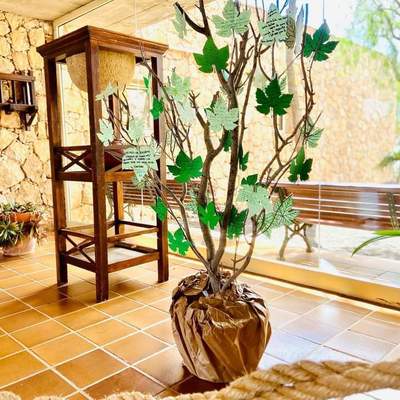CROATIA
During the first project activity the students of our school have done research on the work of the poet Fran Galović and his significance for the local community. They have looked for toponyms and found the locations that have kept his name. The students have also translated a few of Galović's poems into English, so as to connect all the project members with a piece of his poetic work. We have finished this project activity by presenting the results of students' efforts.
Swallows (translated by Andrija Njerš)
They've arrived today. Two of them, I saw
looking for nests round roofs made of straw.
Slowly they fly.
Each I ask:"Why?"
"What have you brought us, small, darling birds?
Wind swirls you seek
Through skies full of sun, along the sea
Skies full of summer, where I'll never be.
Why don't you speak?"
Round the cottage, the young swallows fly, without rest
Looking for thier nest.
What have they brought? Happiness, youth, sunshine,
The joy of days past, songs, flowers, wheat and wine!
While they were fluttering through the unknown
Old cottage was waiting for them to come home.
That's why they're meek
and they don't speak
gazing at the sun, at sky's fullness
flying towards the hills of happiness.
Mentor: Martina Grgac, prof.



| Daybreak (Translated by Doris Hegedušić) | Childe Harold (Translated by Lana Varga) |
| We sat in the corner - left all alone I kissed your pale, joyous face, sour notes of the piano strings miserably flowing past the two of us in the air full of smoke. You wrapped your white, wretched hands powerlessly, tepidly around my neck as some old wilted ivy would wrap itself and cling on to a tree. Wine foamed, ablaze and brilliant, like the Lethe river water we drank. We laughed wrathfully, vividly – then - a moment later drunkenly shed tears. A gray cloud of thick smoke lugged, a wave of intense passionate longing arose and somewhere, in the clear sky, reddening as before death, faded the clear night stars. | Where is my home? – My eyes haven’t seen it For a long time. Its lovely hills Now dream about the melancholic talk Of oaks in a peaceful, eagle’s height. Where is my home? – All my loved ones have been gone Since long ago. – Inspirations glow In my heart – are they dead too? - - Sea all around me. Lonely sea. The sky stays silenced like an old memory Of my fatherland, where the sun shines for me, Where ivy wraps around the front door of my home. Oh, the night sky, hush! – Goodbye, my dear home! You’re vanishing like a wonderful, perished shadow That I will never get a chance to see. |
ITALY
Our students have read some poems by Eugenio Montale, a renowned Ligurian poet, who lived part of his life in one of the fishing villages of Cinque Terre near La Spezia. They have chosen two poems for a compared reading in Italian and in English.

Montale spent his childhood in Monterosso: the colours, the flavours and the winding paths of this area inspired the poet and provided the setting for “Ossi di seppia” (Cuttlefish Bones), his first collection of poems published in 1925.


POLAND
During the realisation of the first project activity student diod a research on the works of Polish poets. They found translations of the selected poems and compared the versions. The activity resulted in producing a short film presenting poetry of selected poets both in Polish and English. The film was played to the school commmunity via the school TV system.
PORTUGAL
Os alunos fizeram uma pesquisa sobre autores regionais. Masacabamos por adiar um pouco a atividade pois vamos trabalhar, e promover um concurso literário na escola onde sejam abordadas as obras de autore regionais. Numa fase final os melhores trabalhos realizados na escola, serão concorrentes ao Concurso Regional "Flashes Literários", que tem como tema a literatura e de âmbito regional.
The students did a research on regional authors. But we end up delaying the activity a bit because we are going to work, and promote a literary contest at the school where the works of regional authors are approached. In a final phase, the best works carried out at the school will be competitors to the Regional Competition "Literary Flashes", which has as its theme the literature and regional scope.


SPAIN
SCHOOL YEAR 2018/2019
Our students will work on this activity during the all school year and during all our ERASMUS + Project LORESU.
On October 24th when we commemorated the INTERNATIONAL DAY OF THE SCHOOL LIBRARY the students looked for information about writers from Poland, Croatia, Italy and Portugal and they chose one piece of each of them to read in Spanish. These week we're going to work with the translation into English of piece of works written by Canarian writers such as Josefina Plá (Fuerteventura),Benito Pérez Galdós (Gran Canaria), Rafael Arozarena (Tenerife),Pedro García Cabrera (La Gomera),María Joaquina Viera y Clavijo (Lanzarote), Antonio Rodríges López (La Palma).
The writers choosen by the students for our Spanish reading activity "LET'S MEET WRITERS FROM POLAND, PORTUGAL, CROATIA AND ITALY" were:
Slavko Jendricko- Croatia
Umberto Eco- Italia
José Saramago - Portugal
Wislawa Szymborska- Polonia
Josefina Plá - España
(Sorry the readings were in Spanish because with this activity we wanted to promote the Spanish reading through writers from the countries which take part in LORESU. Sorry about the pronunciation of the Croatians and Polish writers)
This is a poem by the Majorera writer JOSEFINA PLÁ who was born in Isla de Lobos, Fuerteventura in1903 and died in Paraguay in 1999.

Vaciarme de paisajes, olvidarme caminos,
reedificar el arco de tu desnudo día.
Borrar tus ojos, sendas de mi llagado sueño,
y engriar en mi sangre tus dos terribles manos.
(...La estatua que he vaciado en soledad, volverla
raíz y musgo en tierra, canto y ala en el aire).
...O, en la antípoda lluvia de mi aherrojada llanto,
hacer cantar el muerto pájaro de tu beso.
Tornar a las cenizas las flechas de la llama,
reenhebrar en las venas el hilo del suspiro.
Y del dolor crecido, monstruo y criatura mía,
hacer de nuevo aquella sonrisa que en tus labios
me bautizaba tuya, con el nombre más mío.
Emptying landscapes, forgetting roads,
rebuild the arch of your naked day.
Clear your eyes, paths of my wounded dream,
and engriar in my blood your two terrible hands.
(... The statue that I emptied in solitude, make it
root and moss on land, song and wing in the air).
... Or, in the antipode rain of my aherrortada crying,
make the dead bird sing of your kiss.
To turn to the ashes the arrows of the flame,
to reenhebrar in the veins the thread of the sigh.
And of the pain grown, monster and my creature,
make that smile again on your lips
I baptized you, with my name.
(Translated by students from 1st BAC A and B. Mentor: Carolina Ramos)
BENITO PÉREZ GALDÓS was born in Las Palmas de Gran Canaria in 1843 and died in Madrid in 1920. He is considered one of the best representat of the Realistic Novel in the Spanish Literature.

Juanito reconoció el número 11 en la puerta de una tienda de aves y huevos. Por allí se había de entrar sin duda, pisando plumas y aplastando cascarones. Preguntó a dos mujeres que pelaban gallinas y pollos, y le contestaron, señalando una mampara, que aquella era la entrada de la escalera del 11. Portal y tienda eran una misma cosa en aquel edificio característico del Madrid primitivo. Y entonces se explicó Juanito por qué llevaba muchos días Estupiñá, pegadas a las botas, plumas de diferentes aves. Las cogía al salir, como las había cogido él, por más cuidado que tuvo de evitar al paso los sitios en que había plumas y algo de sangre.
Juanito recognized number 11 on the door of a bird and egg store. There he had to enter without doubt, stepping on feathers and crushing shells. He asked two women who were peeling chickens and chickens, and they answered him, pointing to a screen, that this was the entrance to the stairs of the 11th. Portal and tent were the same thing in that building characteristic of primitive Madrid. And then Juanito explained why he had spent many days Estupiñá, attached to the boots, feathers of different birds. He took them as he left, as he had taken them, as he was more careful to avoid the places where feathers and blood were kept.
(Translated by students from 1st BAC A and B)


CANARIAN WRITERS DAY

On February 21st we celebrate the Day of the Canarian Letters. Each year, in order to celebrate this event, one Canarian writeris chosen and this year we honor the writer Agustín Espinosa have been chosen.
IES LA OLIVA celebrates this date with different activisties. Students from 2º ESO have organised an exhibitions with the life and works of different Canary writers and also the students from 1st BAC and who take part of our Erasmus + LORESU are recording the radio programme where they interviewed Marita de León who has organised this event.
Watch video about the Canary Letters Day
Visit our blog LORESU FUERTEVENTURA for further information
READING DAY
March, 7th we celebrate the READING DAY. On our radio programme some students have read fragments of the book " Herodoto" written by the Canary writer Ángel Camacho Cabrera
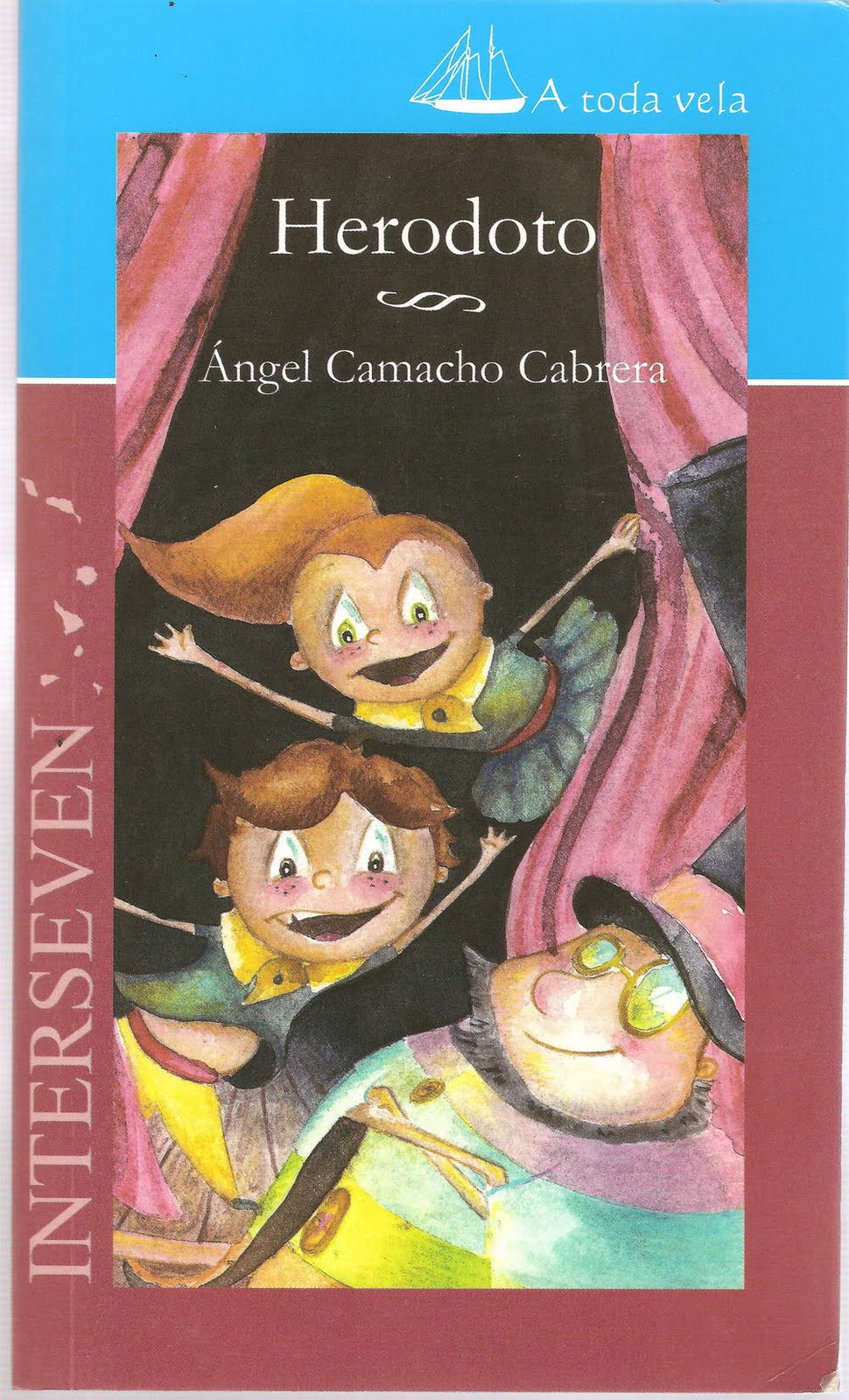
In different groups fragments of books written by Canarian writers (Rafael Arozarena and Tomás Morales) have been read.
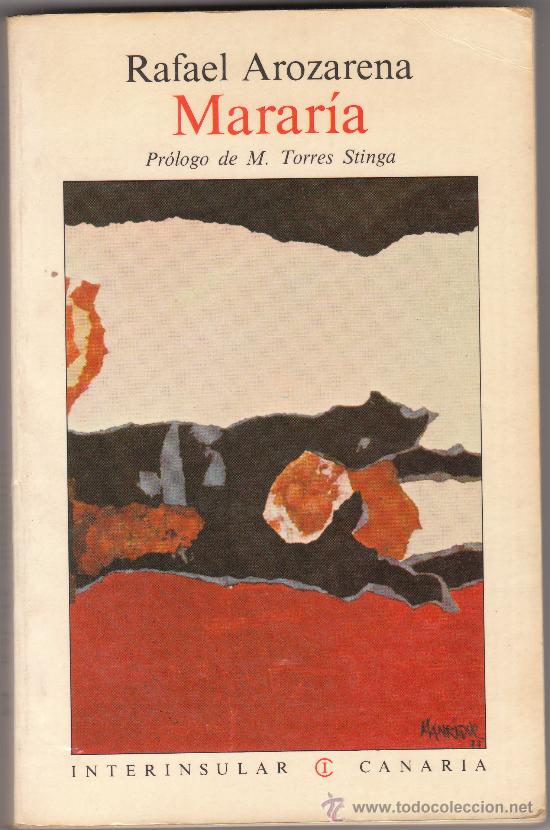
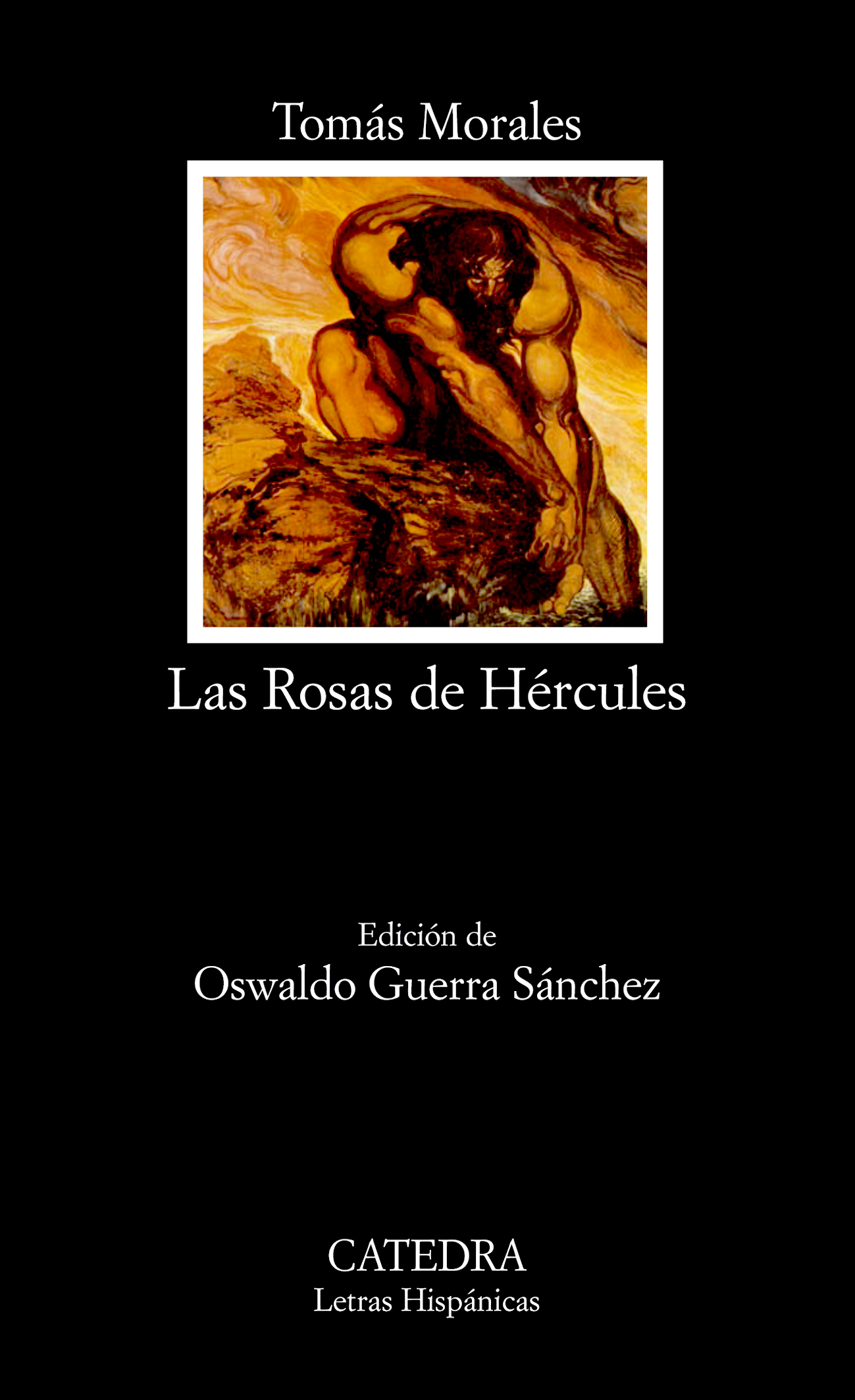
WORLD BOOK DAY
From April 22nd to April 26th IES LA OLIVA has celebrated the WORLD BOOK WEEK. We have organised activities where the students have read poems of our local and national writers buut we have also read poems of writers from the coutries which take part on LORESU. Poems in Italian, Portuguese,Spanish and English have been read (We couldn't find anyone to read poems in Croatioan and Polish- sorry about it).
Watch video about the WORLD BOOK WEEK (1)
Watch video about WORLD BOOK WEEK (2)
MU -LEE -Y PROJECT
This is a project directed by Marita de León, Spanish Language teacher. Its main goal is to spread the knowledge of the Canary Literature and the Canary Lexicon. This project has been included on the RED BIBESCAN activities and it is a way to enrich our LORESU project. Thank you Marita.
Watch video interview about MULEEY PROJECT
SCHOOL YEAR 2019/2020
On October 24th when we commemorate the INTERNATIONAL DAY OF THE SCHOOL LIBRARY the students from 1st BAC have looked for information about writers from Poland, Croatia, Italy,Portugal and Spain and they have chosen one piece of each of them to read in Spanish during the week from October 22nd to October 25th when different activities are going to be held.
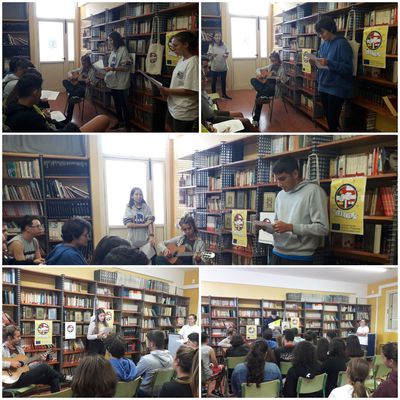

The group of students from 1st ESO C together with their teacher Marita de León have prepared a beautiful activity in which they have read traditional legends from Fuerteventura (The Legend of Mafasca Light and the Legend of Ayose and Guise) and they have given information about 2 writers born in the Canary Islands : Pepa Aurora and Lola Suárez.
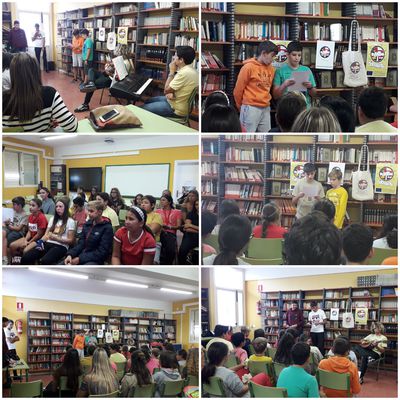
CANARIAN WRITERS DAY 2020

21st February is the DAY OF THE CANARIAN LYRICS DAY that the Canarian Goverment has been celebrated since 2006. The election of this day it is because the Canarian writer José Viera y Clavijo died on February 21st 1813 in Las Palmas de Gran Canaria.
As it has been a tradition at IES LA OLIVA, we have celebrated this day at our library where students have read poems written by JOSEFINA DE LA TORRE MILLARES writer honored in this edition and also extracts of some novels by BENITO PÉREZ GALDÓS (Las Palmas de Gran Canaria 10/5/1843- Madrid 4/1/1920) whose 100 years of his death is being celebrated in all Spain.
 Josefina de la Torre Millares
Josefina de la Torre Millares

Benito Pérez Galdós
The coordinator of RED BIBESCAN, Carolina Ramos and the Coordinators of the project MU-LEE-Y Marita de León and Chamaida Torres have organized this event together with the students of 1 ESO and the ERASMUS + PROJECT LORESU students.


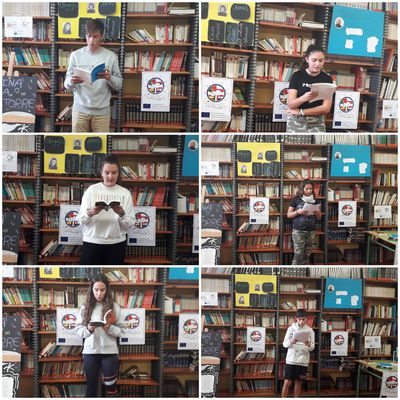

BOOK DAY 2020
LORESU students have made a video to honor the centenary of the death of Benito Pérez Galdós (Las Palmas de Gran Canaria 10th may 1843- Madrid 4th January 1920). We are really grateful for the effort that our students from Croatia, Poland, Portugal, Italy and Spain have done in order to do this activity in these hards times of COVID-19.
During the month of march before the school was closed due to the COVID-19, students were working in mini projects to honor and promote the life and work of BENITO PÉREZ GALDÓS in order to commemorate the BOOK DAY. At IES LA OLIVA we have been celebrated the BOOK DAY during all the month of April and this school year we din't want that the COVID-19 changed our plans.
SCHOOL YEAR 2020/21
IES LA OLIVA through our project LORESU has celebrated the EUROPEAN DAY OF LANGUAGES (26/9/2021). Students and teachers has choosen differnt fragments of the works written by different Canarian writers.
CANARIAN WRITERS DAY 2021

As usual, since in October 2018 our ERASMUS+ LORESU project began, which has given us the opportunity to include Canarian contents of different kinds in our school curriculum, one more year and every 21st February, we celebrate in our high school THE DAY OF CANARIAS LETTERS. The Canarian Government has decided to set this day to commemorate all the Canarian writers who have helped to develop and spread the culture in and of our Islands.
This year NATALIA SOSA AYALA has been chosen as a relevant figure of the Canarian literature not only in Canary Islands but also in the Spanish literature.
Students of 1 ESO A, B, C, D, E and students who belong to the ERASMUS + PROJECT LORESU have organized and have participated in this event creating an exhibition with the biografies and pieces of different Canarian writes works paying special attention to NATALIA SOSA AYALA.
Thank you very much to the teachers Marita de Léon and Chamaida Torres, coordinators of the project MU-LEE-Y 3.0 and Carolina Ramos, coordinator of the Project Erasmus+ LORESU spreading the Canarian literature at IES LA OLIVA.
21st MARCH 2021
IES LA OLIVA celebrates the WORD POETRY DAY creating a POETRY TREE where students has read and copied poems written by Canarian writers.

